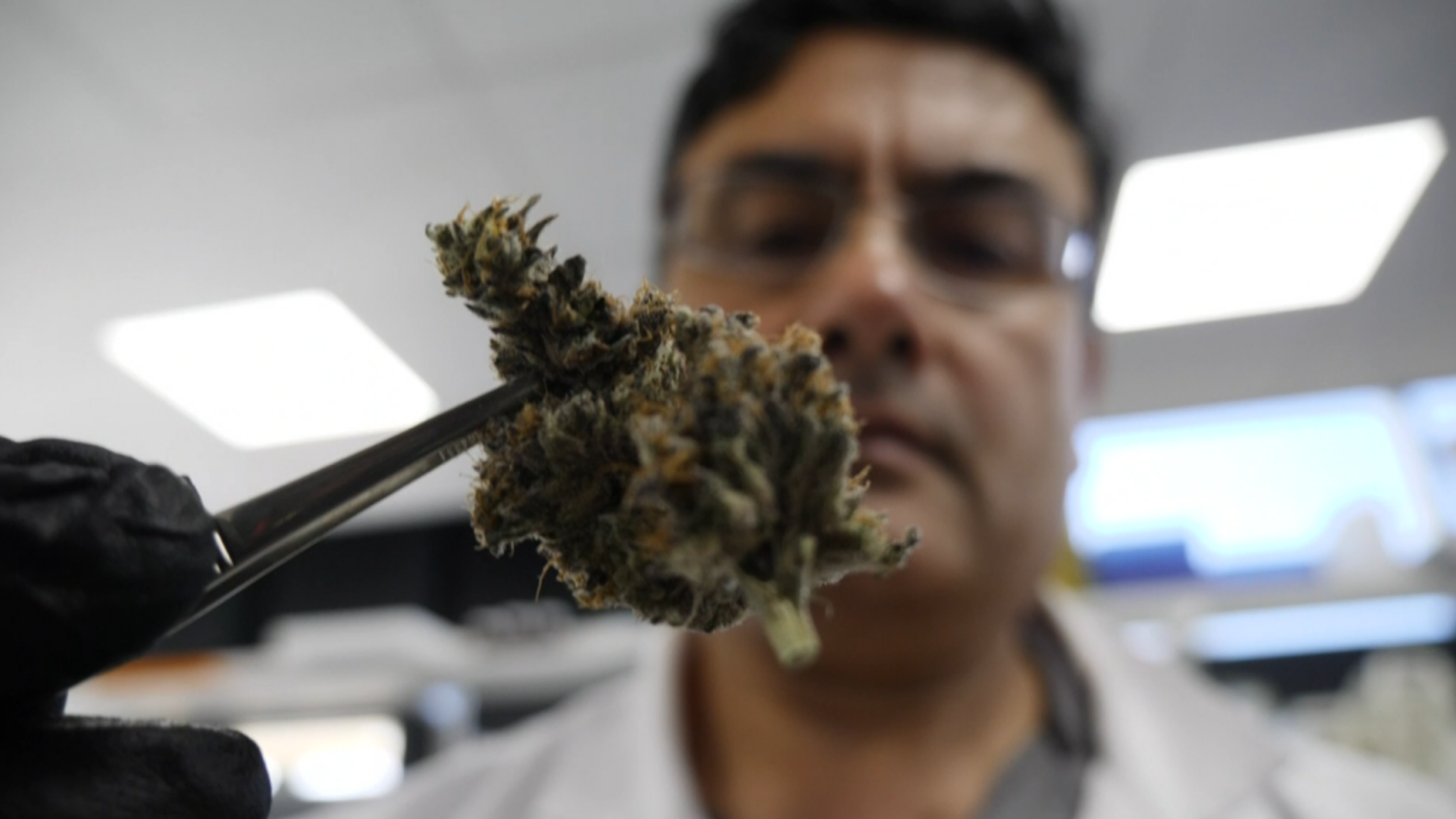Still no medical cannabis trials for NHS - five years on from legalisation
Five years after medical cannabis was legalised, the government still hasn't funded clinical trials that could see it being used on the NHS, Sky News has been told.

The Home Office reclassified the drug in 2018 to allow specialist doctors to prescribe the drug under tight controls.
But a year later the NHS watchdog NICE warned doctors that they shouldn't prescribe the drug to the eight million patients with chronic pain, because it said there weren't enough good quality clinical trials.
Despite the evidence gap, the National Institute for Health Research has now revealed that it hasn't funded any studies on the safety and efficacy of cannabis since the law was changed.
It means legalisation has made little difference to patients who can't afford a private prescription.
Chad Martin pays a clinic around £300 a month for a supply of medical-grade cannabis to ease the pain from arthritis in his hands.
He told Sky News: "I am fortunate to be able to afford the drug. Others can't."
He had been offered opioid painkillers by his GP, but rejected treatment because they can be addictive and have serious side effects.
Since he started using cannabis in a dose-regulated inhaler, the pain and inflammation in his hands have reduced and he has returned to work.
"It's been really great actually," he said.
"When the weather changes, arthritis can affect you regardless, but cannabis has worked way better than anything else I've taken in the past."
He said having it prescribed gave him greater confidence in what he was taking than buying it illegally on the street.
Not all patients respond so well to the drug. And the Home Office warns regular use of cannabis can lead to dependence and mental health problems.
To try and provide more robust evidence on the use of the drug, Celadon Pharmaceuticals is now starting the first clinical trial of its kind in 5,000 patients with chronic pain.
It grows cannabis plants in special chambers, where light, humidity, temperature and nutrients can be precisely controlled to produce flower buds containing predictable amounts of active compounds.
Unlike other cannabis medicines, Celadon's plants contain the psycho-active chemical THC, though at levels too low to cause a high.
James Short, the company's co-founder, said of all the businesses he had set up in his career, Celadon had been the hardest.
"We are a pharma company, not a cannabis company," he said.
"We've got to try and get away from the stigma. When I first got involved in the business I was nervous to even talk about it with friends.
"But our job is not to get people high. It's to give them a better quality of life."
Medical cannabis is still controlled by the Home Office as a narcotic.
ADHD patients are self-medicating with cannabis
But for it to be prescribed, it also has to be regulated as a medicine.
"It's been hard to get them to work together because the regulation wasn't really baked in correctly," said Mr Short.
As part of the trial, patients are given ground cannabis buds in a special inhaler that only dispenses the prescribed dose.
The trial has been approved by the Medicines and Healthcare products Regulatory Agency (MHRA) and the NHS Research Ethics Committee.
Approval followed a preliminary study on 500 patients, which showed that cannabis reduced the need for opioid painkillers and improved sleep.
But it's far from clear whether even the larger trial will convince medical authorities.
Dr Alan Fayaz, an NHS consultant and a spokesperson for the British Pain Society, said there's plenty of real-world evidence from patients that cannabis works, but doctors are right to be cautious.
"In the aftermath of what happened with opioids the medical community is understandably a little bit sceptical about introducing a new drug without really robust evidence," he said.
"The opioid epidemic has perhaps done cannabis a bit of a disservice because it's tainted ground."
He said changing the law before there was good clinical evidence of benefit and safety had been detrimental.
"It creates this bizarre two-tiered system which actually doesn't advantage the patients on the NHS and it doesn't really advantage the patients in the private sector either.
"I think what we need is the research to be able to identify the role cannabis will play."
The Home Office said it had asked its expert advisers to assess whether there are any barriers to conducting research on the medical effects of cannabis.
-sky news






